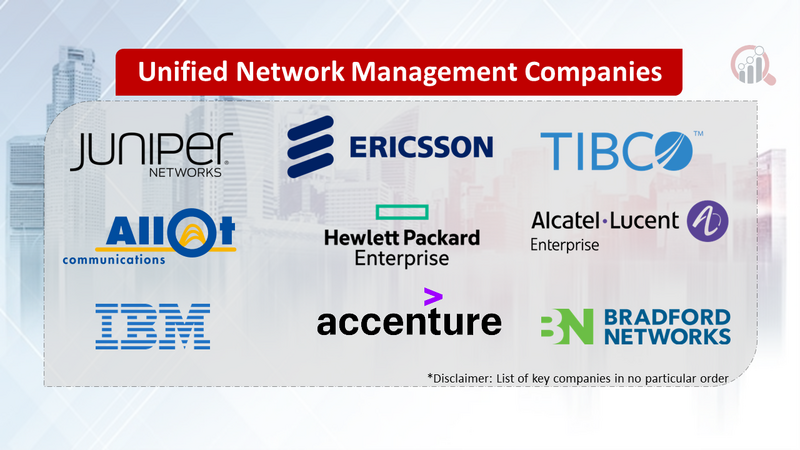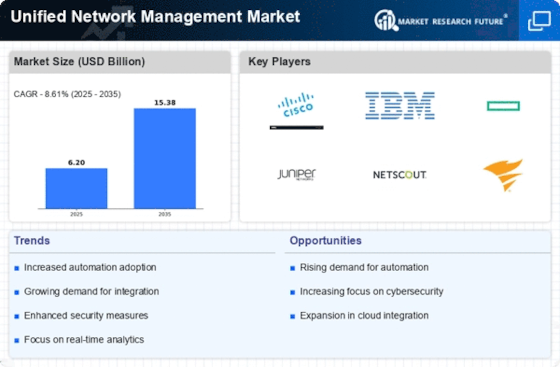Top Industry Leaders in the Unified network management Market

Competitive Landscape of Unified Network Management Market:
The unified network management (UNM) market is experiencing explosive growth fueled by the ever-increasing complexity of enterprise networks. Gone are the days of siloed network management tools; organizations now demand comprehensive solutions that can seamlessly oversee wired and wireless networks, cloud infrastructure, and security elements. This dynamic landscape is home to a diverse range of players, each vying for market share with distinct strategies and offerings.
Key Players:
- Juniper Networks (U.S.)
- Allot Communication (U.S.)
- IBM Corporation (U.S.)
- HP (U.S.)
- Ericsson (Sweden)
- Accenture PLC (Ireland)
- Alcatel-Lucent S.A. (France)
- Bradford Networks, Inc. (U.S.)
- Tibco Software (U.S.)
- Sandvine Inc. (Canada)
- Brocade Communications Systems, Inc. (U.S.)
- Cisco Systems, Inc. (U.S.)
- Ascom Holdings AG (Switzerland)
Factors for Market Share Analysis:
- Product Portfolio Breadth and Depth: The wider and deeper a vendor's portfolio, encompassing everything from core network monitoring to advanced security and automation features, the more attractive their offering becomes.
- Technological Innovation: Integrating cutting-edge technologies like AI, machine learning (ML), and SDN into UNM solutions provides a significant competitive edge. Players who excel in developing and implementing these technologies will solidify their market position.
- Deployment Flexibility: Whether offering on-premises, cloud-based, or hybrid deployment options caters to diverse customer needs and preferences, impacting market share.
- Pricing and Licensing Models: Flexible pricing models like subscription-based services and tiered offerings cater to different budgets and organizational sizes, influencing market share.
- Customer Support and Services: Providing robust customer support, training, and consulting services builds trust and loyalty, leading to market share gains.
New and Emerging Companies:
Several new players are entering the UNM market, bringing fresh perspectives and innovative solutions.
- Network Analytics Startups: Companies like Niara and Big Switch Networks are redefining network management with AI-powered analytics, offering real-time insights and proactive problem-solving capabilities.
- Security-Focused Vendors: Cybersecurity specialists like Palo Alto Networks and MacAfee are expanding their portfolios to include UNM solutions with integrated security features, addressing the growing convergence of network management and security.
- Open-Source Solutions: Open-source platforms like LibreNMS and Zabbix are gaining traction among cost-conscious organizations and communities, offering alternatives to traditional vendor-locked solutions.
Current Investment Trends:
Companies in the UNM market are actively investing in several key areas:
- SDN and Cloud Integration: Seamless integration with SDN and cloud infrastructure is critical for managing modern hybrid networks. Vendors are investing in developing solutions that leverage these technologies.
- AI and ML-Powered Automation: Automating routine tasks and providing intelligent insights through AI and ML is a major focus area, aiming to streamline network operations and reduce human intervention.
- Security Integration: With cyber threats on the rise, integrating robust security features and threat detection capabilities into UNM solutions is gaining significant investment.
- User Experience and Simplicity: Simplifying the user interface and offering intuitive dashboards are crucial for improving user adoption and overall user satisfaction.
Latest Company Updates:
Oct 26, 2023, Cisco Systems acquires ThousandEyes, a network intelligence platform, to strengthen its unified network management offerings.
Nov 15, 2023, Juniper Networks unveils its new unified network management platform, Contrail Enterprise 7.0, with enhanced security and automation features.
Dec 5, 2023, VMware announces the integration of its NSX Network Manager with vRealize Automation, streamlining network management for hybrid and multi-cloud environments.









